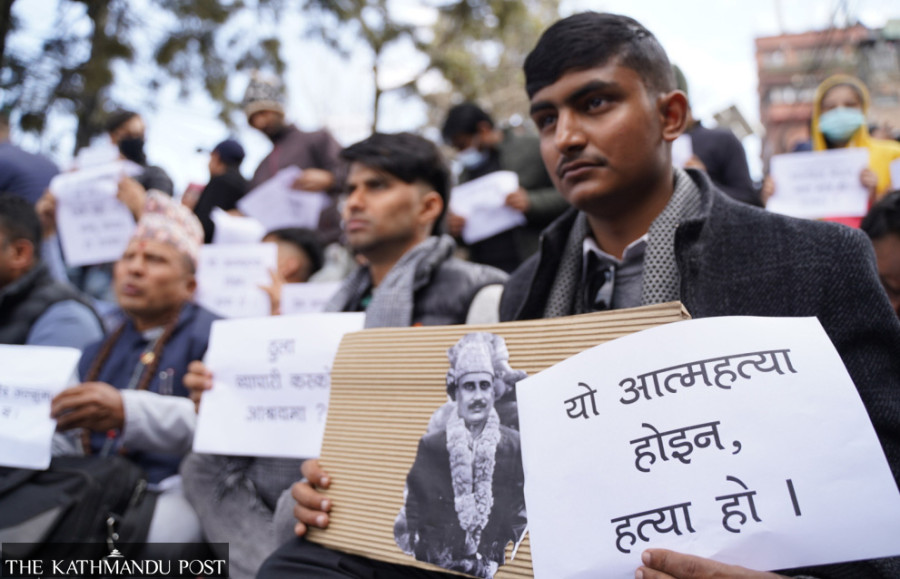National
‘It’s a murder, not suicide’
Self-immolation by a young man, who accused the state of failing him repeatedly, could be the tip of a much bigger social problem, experts say.
Anup Ojha
Prem Prasad Acharya died a difficult death. On Tuesday, he set himself on fire in front of the Parliament building at New Baneshwar, Kathmandu. Videos circulating on social media after the incident showed Acharya running to the middle of the road while Prime Minister Pushpa Kamal Dahal was just leaving the Parliament with a motorcade, before he set himself on fire. Acharya was rushed to the Kirtipur-based burns hospital but it was too late. He was pronounced dead early in the morning on Wednesday.
Dr Surendra Basnet, chief at the burn ward of the hospital, said that by the time Acharya was admitted to the hospital 80 percent of his body had burn injuries.
Before setting himself on fire, Acharya, 37, who hails from Ilam, had written a long note on Facebook, describing his struggle—particularly about how he failed in his goals due to the state’s failure to monitor illegal activities of big corporate houses and other assorted frauds. Acharya not only detailed his struggle to solve his financial problems but also offered a list of 25 suggestions to ensure good governance.
He has asked the state to create a conducive environment for citizens like him who are willing to ply their trade in the country, unlike millions who have left the country for better opportunities abroad.
Acharya’s death has sparked a conversation about the duties of the Nepali state towards its citizens, especially towards those who despite their genuine efforts cannot succeed either in landing good jobs or in entrepreneurship. And about what the state should do to ensure that they would not resort to extreme steps like the one Acharya took on Tuesday.
Acharya’s death reflects the abject failure of the state on multiple fronts—this has been the refrain among the public and even some prominent political leaders.
Taking to Twitter, Nepali Congress General Secretary Gagan Thapa wrote that the incident was not the failure of a person but of the whole state mechanism and system. “This is the failure of us who run the system,” he wrote.
Deputy Prime Minister and Home Minister Rabi Lamichhane expressed similar sentiments on Facebook earlier in the day. “In this case we are guilty. I am guilty,” Lamichhane wrote.
“Each and every unit, departments and organs of the state have failed in this case,” Mayor Balen Shah wrote on Facebook.
Former finance secretary Rameshore Khanal said the government should at least do these three tasks to avert incidents like this one in the future—first, simplify bureaucratic procedures for any kind of services that the general public seek. For example, if somebody wants to register a company, they should not have to face the kind of hassles they now do, Khanal said.
Put the right person in the right position, Khanal stresses. The government should make such a mechanism so that no service seeker has to return home without completing their task at public offices, he said. The third of Khanal’s points concerns the provision of reward and punishment for government officers. “As things stand, the government only rewards officials who have links with politicians,” said Khanal. “That should change.”
Khanal also pointed to bureaucratic failures. For example, the agriculture ministry does not recognise the real farmers while giving grants, he said. “Instead, those who have links with political parties but do not even own any farms enjoy the grants by forging documents.”
Sociologists have different take on the issue. Guman Singh Khatri, an assistant professor at the Central Department of Tribhuvan University, said society and the state are responsible for an individual’s suicide.
“If you look at the case of Acharya, there are various social causes that led him to burn himself,” Khatri said. “The incident highlights the hardship and frustration that beset youths who want to stay in Nepal and do something on their own.”
Khatri cites the socio-economic problems caused by the Covid-19 pandemic, political instability, economic recession, increase in taxes, and lack of law and order in the country as reasons behind Acharya’s self-immolation.
Mina Upreti, a lecturer of sociology at the Tri-Chandra Multiple Campus, says this incident hints at how Nepali society still doesn’t care enough about mental health issues. She pointed out the lack of proactive role of family, society and the state in preventing suicide. “Family members, society and the state all should play a role in preventing suicide cases,” she said.
After Acharya’s demise on Wednesday, many Nepalis took to social media to weigh in on the incident.
“You need not to do PhD on why Nepal didn’t develop, if you read Acharya’s suicide note that's enough,” wrote Madhav Karkee, with the Twitter handle @madhabkarkee.
Another Twitter user Panta Nava Raj PhD questioned if Acharya’s self-immolation would bring any change in the country's economic policies. “Would this incident bring an end to carteling?” he wrote.
Meanwhile, a group of activists took to Kathmandu’s streets on Wednesday afternoon over Acharya’s death. The protestors marched from Maitighar to New Baneshwar, to the spot where Acharya had immolated himself. Dubbing their protest ‘Kathmandu Uprising,’ they carried placards that read ‘it’s a murder, not suicide’, and ‘‘Is this country a slaughterhouse?’
The march culminated in a sit-in at New Baneshwar. Addressing attendants, Sanjeev Upreti, an activist and professor of English, lamented the loss of life of the youth who was victimised by the country’s existing socio-economic status. “Acharya’s story is so emotional that he has tried time and again to come back from one failure after another, only to be let down by the country’s socio-economic structure,” Uprety said.
Acharya’s story reflects the condition of hundreds of thousands of youths in our country, Uprety added. “We are compelled to come to the streets to demand that this situation be ended,” he said.




 18.12°C Kathmandu
18.12°C Kathmandu.jpg)














